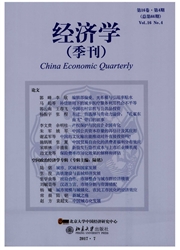

 中文摘要:
中文摘要:
研究中国经济改革的文献倾向于将经济改革等同于经济分权。然而,各种经济指标均显示这两个过程实际上是有差别的:经济分权实际上在20世纪70年代初期就发生了,在时间上早于经济改革。本文认为,经济分权实际上是政治精英权力结构变迁所产生的一个结果:“文化大革命”改变了政治精英的权力结构,在中共中央委员会中中央政治精英的比重下降,而地方政治精英的比重大幅上升。政治精英的权力结构影响了经济分权政策的持续性,因此中央政府在80年代继续推行了迎合地方利益的经济改革。由于权力结构的变化,90年代开始的经济集权也可以用类似的逻辑来解释。此外,对国民党统治下的中国台湾和对苏联的案例分析也在一定程度上印证了我们的解释框架具有一般意义。
 英文摘要:
英文摘要:
The literature on the Chinese economic reform today equates reform with decentralization. Our study on multiple economic indicators shows that in fact these were two distinct processes. Decentralization of the Chinese economy began much earlier during the Cultural Revolution (1966--1976) and it was the product of a political shock, i. e. the Cultural Revolution, which changed the relative balance of power in the CCP elite from favoring central agencies to favoring local interests. Using a biographical database of the Central Committee, we show clearly that the change of elite composition which began in the late Mao period preceded economic decentralization. After the Third Plenum of the 11th Central Committee in 1978, it is understandable to pander to local interests through enacting even more decentralization policies which were marked by the reform on rural household responsibility system. The recentralization of the Chinese economy in the 1990s can likewise be explained by this mechanism.
 同期刊论文项目
同期刊论文项目
 同项目期刊论文
同项目期刊论文
 期刊信息
期刊信息
